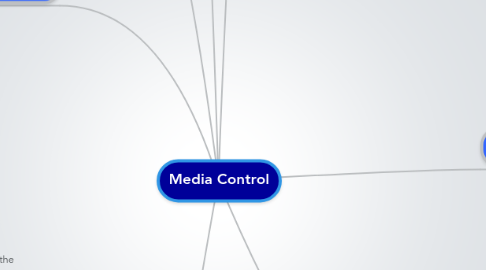
1. Benefits of a free press
1.1. holds officials accountable
1.2. helps public make informed political decisions
1.3. protects the vulnerable/unrepresented population (human rights, etc)
1.4. more democratic discourse in public sphere
2. Stakeholders in media
2.1. the press/media
2.2. government
2.3. businesses
2.4. the masses/audience
3. Development Media in Africa
3.1. Overview
3.1.1. state & press - mutually beneficial relationship
3.1.2. Challenge: finding balance between reporting the news and political stability
3.2. State vs Private (Ghana)
3.2.1. State journalism
3.2.1.1. state journalism: emphasis on public responsibility and national interest
3.2.1.2. editorial staff at state newspapers often change with elections
3.2.1.3. solis (gifts) more common in state journalism vs private press
3.2.1.4. state journalists must cover intended angle
3.2.2. private press
3.2.2.1. info often exchanged in informal settings, may be leaked to private press (?)
3.2.2.2. could more access actually make private press coverage of the govt less critical?
3.3. Gombo (Cameroon)
3.3.1. In practice
3.3.1.1. creates "patronage culture"
3.3.1.2. incentive for topics of coverage and framing of story
3.3.1.3. institutions which do not pay gombo face no coverage or negative coverage
3.3.2. weak journalistic institution
3.3.2.1. seen as coping mechanism for low salaries
3.3.2.2. reporting bias due to or in hopes of gombo
3.3.3. erodes press quality
3.3.3.1. the quality and diversity of press suffers when it becomes an extension of political/commercial interests
3.3.3.2. lack of investigative reporting
3.3.3.3. lack of alternative or minority view ponts
4. The business of media
4.1. Social Inequity
4.1.1. media often represents the interests of the "elites"
4.1.2. the socially marginalized lack ability to express their interests
4.1.3. top tier new organizations often define the news agenda
4.1.4. "working-class and radical paper" at disadvantage because advertisers are not interested in their readership
4.2. "industrialization of the press"
4.2.1. tech improvements
4.2.2. emphasis on wider reach
4.3. Advertisers
4.3.1. influence content of media
4.3.2. interested in "attracting audiences with buying power"
4.3.3. can discriminate against "unfriendly media institutions"
4.3.4. less interested in supporting "documentary-cultural-critical" content
4.4. Investor influence/corruption
4.4.1. non-media companies now have large stakes in media companies
4.4.2. a mutual dependency between the media & their patrons
4.4.3. the practice of buying expert opinion, who then echo the official view
5. Challenges to a free press
5.1. characteristic of a weak press
5.1.1. lack of solidarity among media practioners
5.1.2. journalists taking bribes to make a living
5.1.3. poverty
5.1.4. corruption
5.2. hard control
5.2.1. censorship laws
5.2.2. spying on journalists (Ghana's BNI)
5.3. soft control
5.3.1. consistent with democracy?
5.3.1.1. "western reporters have room to negotiate soft control"
5.3.1.2. "a sign that African information economy has joined the world" ?
5.3.2. Filters (Herman & Chomsky) - service "important domestic power interest"
5.3.2.1. producing "flak"
5.3.2.1.1. flak = negative response to media statement of program
5.3.2.1.2. common political tool - govt often "assailing, threatening and 'correcting' the media"
5.3.2.2. anticommunism
5.3.2.2.1. disenfranchises the left/labor movements
5.3.2.3. media ownership favors the wealthy and powerful
5.3.2.4. advertising = primary media revenue sources
5.3.2.5. reliance on "official" sources
5.3.3. incentives/disincentives
5.3.3.1. withholding ad $
5.3.3.2. demotion/low pay
5.3.3.3. bribes/gifts/promises
5.3.3.4. selective access to govt meetings, officials
5.3.4. agenda setting
5.3.4.1. dictating "worthy" and "unworthy" victims
5.4. self censorship
5.4.1. feels as if the social structures are impossible to change or risk is too high, does not report
5.5. media defense mechanisms
5.5.1. lobbying
5.5.2. political alliances
6. Sources
6.1. Review of 'The Murdoch Archipelago' - Lanchester
6.2. Ghana: Soft Control of the Press - Fair
6.3. The National Discourse and the State Apparatus - Hasty
6.4. Public Sentinel: News Media and Governance Reform
6.5. Manufacturing Consent - Herman & Chomsky
6.6. Gombo - Ndangam
7. Case Study: Murdoch
7.1. Murdoch media empire
7.1.1. 2 main insights:
7.1.1.1. "news gradually giving place to entertainment"
7.1.1.2. "modern media company needed to be global in its reach"
7.1.2. financials
7.1.2.1. huge international media conglomerate, confusing to the average person
7.1.2.2. $ moved between trusts and offshore entities to minimize tax liability
7.1.3. political influence
7.1.3.1. papers fully supported Thatcher
7.1.3.2. "puts his political interests to work to serve his business interests"
7.1.4. influence on journalism
7.1.4.1. headline: "journalism gone so wrong that is isn't journalism anymore"
7.1.4.2. "Murdoch takes what we want, and gives it back to us in a coarser version - and we find that we prefer it that way"
7.1.5. the pseudo-alliance with the "common man"
7.2. New of the World (NoW) - phone hacking scandal 2010 - 2012
7.2.1. Timeline via BBC
7.2.1.1. late 2010 - news emerges regarding NoW phone hacking (investigations from NYT, Guardian, etc)
7.2.1.2. early 2011 - NoW resignations, arrests
7.2.1.3. June 2011 - celebrities compensated for phone hacking in courts
7.2.1.4. July 2011 - The Guardian alleges NoW hacked into the voicemails left for murdered schoolgirl Milly Dowler. Then editor Rebekah Brooks denies knowledge of this.
7.2.1.5. July 7, 2011 - Murdoch shuts down NoW
7.2.1.6. July 13, 2011 - Murdoch withdraws full ownership BSkyB bid
7.2.1.7. Mid July, 2011 - Brooks resigns, Murdoch faces MPs questions
7.2.1.8. Fall 2011 - more incriminating details emerge, Hugh Grant gets involved
7.2.1.9. Early 2012 - more arrests and victim settlements
7.2.1.10. April 2012 - James Murdoch resigned as BSkyB chairman, still denies knowledge of phone hacking
7.2.1.11. May 2012 - MPs declare Murdoch unfit to run a major media company
7.2.1.12. Mid 2012 - continued investigations, arrests, 8 people charged over phone hacking
7.2.2. video overview via Telegraph
